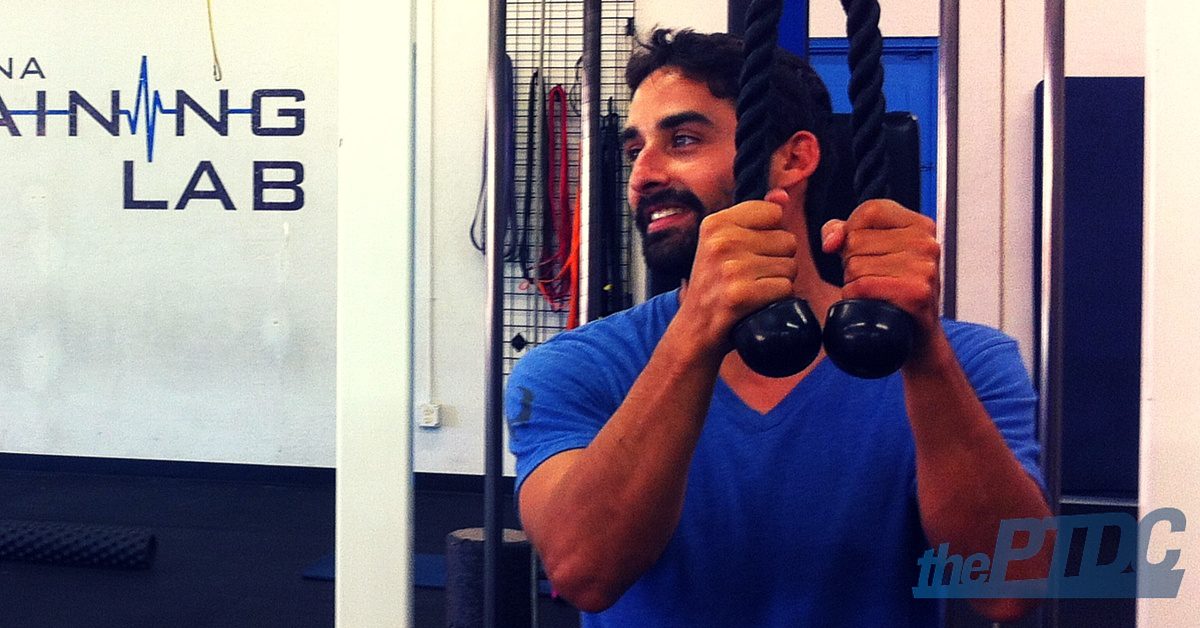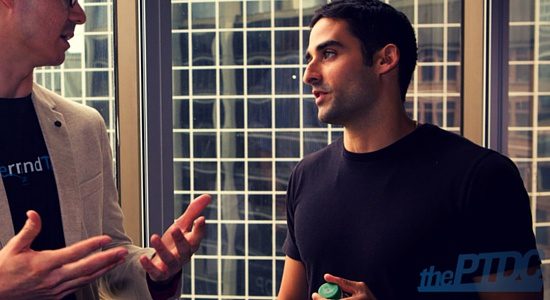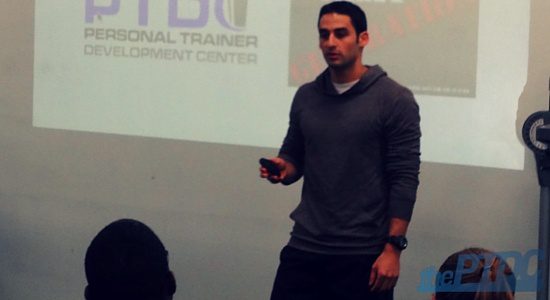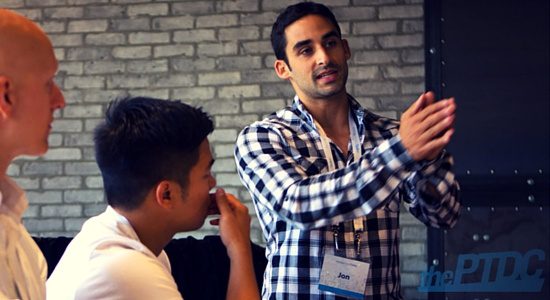Every so often, we'll feature coaches from this great The PTDC community that are really killing it and changing lives within their world, and ask them to share their training, business, and productivity practices.
To kick off the inaugural edition of Ask a Fit Pro, we thought it'd make perfect sense to talk to Jonathan Goodman. You might've heard of him. He's the man behind The PTDC and author of Ignite the Fire and the more recent Viralnomics.
So we're all itching to know: what the hell is in his Wheaties and how can we get some of it?
Location: Originally from Toronto, Canada. Currently I'm in Nosara, Costa Rica
Current position: PTDC Head Coach
Certifications: BKin (hons). Was previously a registered Kinesiologist and Certified Strength and Conditioning Coach (CSCS), but have let all designations lapse.
What's the one word that describes how you approach your personal training/coaching?
Intuitiveness.
What is your main training focus? For yourself and your clients?
If I had to narrow it down, I'd say it is fun and exploratory. I've dabbled in a little bit of everything: kettlebell competition training, photoshoot prep, power training, and so on. Nowadays, I'm more about finding whatever I can wherever I'm at in the world and getting a great sweat in.
What's your morning routine like?
Morning is my heavy brain work time. Alarm is set for 6 or 6:30, but I'm usually up before. Armed with a coffee con honey, I sit down and hammer out the most important thing for me to accomplish that day as set the night before.
I figure that if I can do a minimum of 30 minutes of proactive work on my business every day I'm constantly going to move forward. That slow and steady progress is much more important than going for big bursts at once.
Your favorite aspect about being a personal trainer.
I used to love the little "ah-ha" moments my clients would get. The big "I lost 20 pounds" is cool, but when an elderly client came into the gym and told me that she was able to climb a ladder to change a lightbulb, that was truly special. She hadn't been on a ladder for years and thought that she would never be able to use one again. Basically, it was recognizing all the little things that made the job great.
What is your best time-saving shortcut to do better work?
Surround yourself with people who are smarter and do better work than you in their specific field, and don't ever be embarrassed to reach out for advice or help.
What are some of your favorite technological tools to help you stay on top of everything?
I have a few that really help me stay focused:
- Self-control: An app that blocks social media for a desired time.
- Evernote: I use it for everything from ideas to notes while I read.
- LastPass: Because my team works around the world, password management is a big issue. LastPass has proved to be invaluable.
- TunnelBear: Allows me to have a VPN (Virtual Private Network) anywhere in the world so that I can work securely on shared networks in coffee shops.
- Slack: A great communication tool for keeping in touch with my team.
- Tripit: I travel a lot and this is a great way to keep track of my travel plans. It's stupid simple to use. Just forward any booking email and it automatically captures the information and builds a trip.
- Gmail: We use extensive filters and canned responses to keep on top of email.
- Follow up.cc: A service that allows me to delay the sending of a message in Gmail, or send a message at a later date. It makes staying at "inbox zero" really easy.
- TimeTrade: Calendar software for booking appointments and calls.
What's your client screening process like? How do you decide how to start writing a program or working with a client?
It's been a long time since I wrote a program for a client to be honest. I wouldn't even be comfortable doing it now. By the time I stopped training, I had a number of templates for the different clients that I worked with. When I did take on somebody new, I'd do an assessment on intake and individualize whatever template was most appropriate for them.
As the training went on, I'd continually adapt the program as I learned more about how their body reacted and their at-home habits, and got a better grip on their goals.
How do you organize all of your clients and schedules?
I was an old-school, pen-and-paper guy. My files were a bit of a mess. By the end, I had all programs in Excel and saved them on my computer. If I were to do it today, I'd probably use software like Trainerize and an iPad because it allows me to give my clients their own app with my program to fill out in real time, do all the charting, and knock out other things that I used to do manually.
What are you currently reading? And is there a book you recommend that all coaches read (doesn't have to be fitness related)?
I'm currently reading The Amazing Adventures of Kavalier & Clay, not sure whether I like it or not yet. Recently finished All the Light We Cannot See and thought that it was one of the most simultaneously beautiful and sad stories written.
Aside from my book, Ignite the Fire, I think Let Go by Dan John is a must-read for anybody involved in fitness and coaching industries.
What other activities or hobbies do you engage in to step away from "just being a coach?"
I love to get out and explore. This usually means hiking or trekking. In the last two years, my fiancee, Alison, and I have had the pleasure of hiking through 17 North American national parks in addition to some hiking and trekking across places in Uruguay, Costa Rica, Brazil, Iceland and Scotland.
Your favorite quote:
It's hard to pick one. I'm a bit of a quote fanatic (I have hundreds saved in my Evernote), but I'll share one that's particularly meaningful because it's been one of the few things in my "About" section on Facebook since day one:
"I will act now. I will act now. I will act now. Henceforth, I will repeat these words each hour, each day, every day, until the words become as much a habit as my breathing, and the action which follows becomes as instinctive as the blinking of my eyelids. With these words I can condition my mind to perform every action necessary for my success. I will act now. I will repeat these words again and again and again. I will walk where failures fear to walk. I will work when failures seek rest. I will act now for now is all I have. Tomorrow is the day reserved for the labor of the lazy. I am not lazy. Tomorrow is the day when the failure will succeed. I am not a failure. I will act now. Success will not wait. If I delay, success will become wed to another and lost to me forever. This is the time. This is the place. I am the person." -Og Mandino
What was the best lesson you learned when you first started that now helps you out a lot?
My two golden rules of success passed down by my mentor, Tom:
Rule #1: Do a great job.
Rule #2: Make sure that everybody knows about it.
Plus, documenting everything I do is really important. Systems are everything. With proper systems and documentation, I can hire on others to take over the aspects of my personal and professional life that I'm not great at. Not only that, but great systems can be sold (like the systems I've built for operating a great online training business).
What are your future aspirations?
I've got big plans for growing the PTDC, sure, but using it as a jumping off point for developing things to help great trainers make a bit more in a bit less time so that they stay happy, healthy, and creating positive change on the ground level in our industry.
Turning a love of training into a successful vocation is a challenge for many coaches. Any advice?
Get great at building relationships with as many people as possible. Do whatever you can to stay at the top of mind for as many people as possible. Never burn your bridges. Always stay positive. Always be helping. And always be getting better every. Single. Day.













